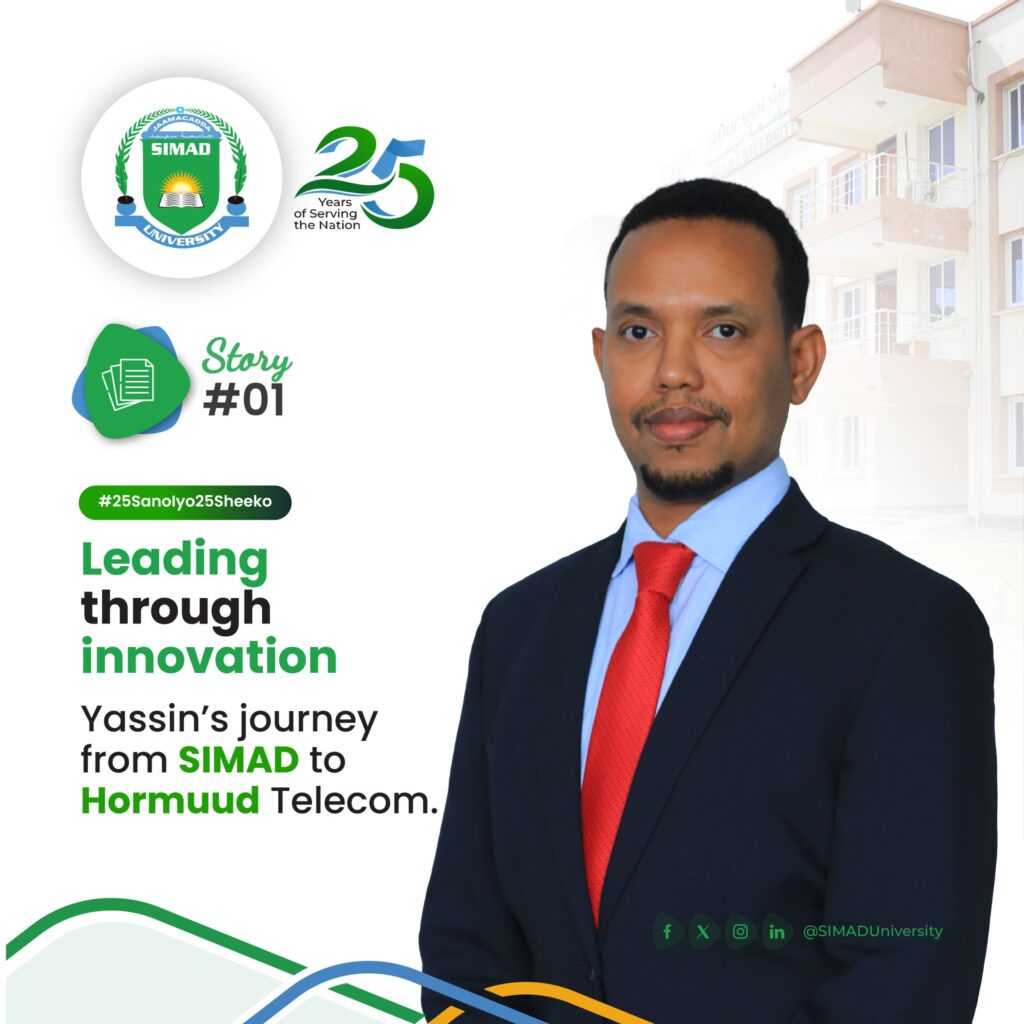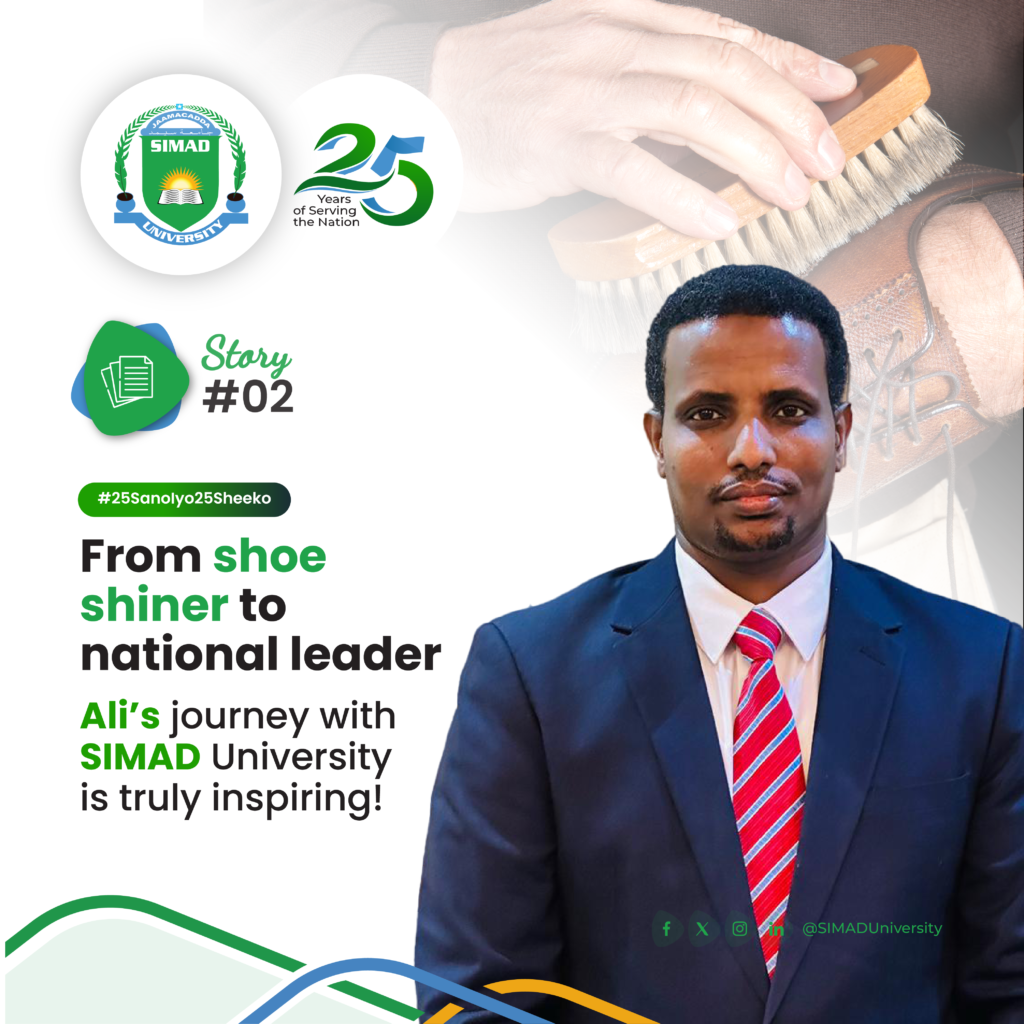Abdinor Dahir, a dedicated leader and visionary, stands as a testament to the transformative power of SIMAD University. Born and raised in Somalia, Abdinor’s journey spans multiple fields—from journalism to academia, to his current role as a successful businessman. He began his academic journey at SIMAD University in 2009, a time when the institution was still an institute of higher learning, not yet a university. Despite other educational options, Abdinor chose SIMAD, captivated by its disciplined environment, dedicated faculty, and its commitment to excellence. He graduated in 2013, and within six months, joined the SIMAD staff, marking the beginning of a career that would span continents and industries.
Shortly after joining SIMAD’s staff, Abdinor received a scholarship from the Turkish government. He moved to Turkey to pursue a master’s degree in public administration at Sakarya University. His drive for excellence soon took him into Turkey’s private sector, followed by an influential position in the media, where he served as the Sub-Saharan Africa Program Director at TRT World Research Centre. He then pursued a second master’s degree in African Studies at the prestigious University of Oxford. Returning to Somalia three years ago, Abdinor worked as a senior advisor in the Somali government before establishing Taloford Consulting, a development and research firm operating in Nairobi, Mogadishu, and London.
Reflecting on his formative years at SIMAD, Abdinor attributes much of his professional success to the culture of discipline, hard work, and resilience instilled in him by the institution. He recalls a mantra among students at the time, “Izgubit,” a Somali term that emphasized the importance of relentless effort—not merely to pass exams but to cultivate skills that set them apart in the competitive job market. This culture, driven by SIMAD’s faculty, required constant creativity and critical thinking. Abdinor describes how his professors challenged him and his peers with demanding assignments and rigorous class discussions, fostering an environment that pushed students to their limits.
A particularly formative experience for Abdinor was his thesis research, guided by a professor named Haraf. Known for his exacting standards, Professor Haraf demanded excellence, requiring students to conduct real fieldwork, design surveys, and defend original research. Abdinor vividly recalls the numerous revisions, late nights, and extensive feedback from Professor Haraf, who often provided up to 100 comments on a single paper. This rigorous academic training became the foundation for Abdinor’s analytical and research skills, which have proved invaluable in his current role at Taloford Consulting.
When he continued his education abroad, Abdinor found that the discipline and work ethic cultivated at SIMAD set him apart. In Turkey and later at Oxford, he noticed that the resilience and rigor he had developed at SIMAD gave him a distinct advantage. This grounding, he explains, is akin to a marathon runner’s training, providing the endurance and focus necessary for success in highly competitive environments.
Abdinor’s connection to SIMAD goes beyond academics. The title “Ustad,” given to everyone within the SIMAD community—from students to staff—symbolizes respect and unity, creating a sense of family that has extended into his professional life. The SIMAD alumni network has served as a valuable source of support and collaboration. Whether in government offices, NGOs, or the private sector, the bond shared among SIMAD alumni fosters a culture of mutual respect and networking, which has been instrumental in his career development. Since his return to Somalia, Abdinor has witnessed the country’s transformation firsthand. Where once there were only villas and small houses, now high-rise buildings, bustling businesses, and a thriving private sector paint a new picture of Somalia’s progress. This rapid development, coupled with the influx of diaspora returnees and international professionals, reflects Somalia’s growing potential.
Abdinor advocates for evidence-based policymaking to drive Somalia’s development further. He observes that decision-making in Somalia, both in the public and private sectors, often lacks a data-driven foundation. He calls on SIMAD and other institutions to prioritize research and data collection to support sound decision-making. He believes that by preparing students for rigorous research, SIMAD can play a critical role in addressing the country’s needs, particularly in sectors like energy, where reliable data is essential for attracting international investors.
Through Taloford Consulting, Abdinor has taken on the responsibility of bridging knowledge gaps and fostering growth within Somalia. His consulting firm, staffed by approximately 100 employees, supports numerous Somali households, contributing to national economic development. He is a strong advocate for the Somali diaspora to return home, invest, and create change, asserting that the impact one can make in Somalia is far greater than in saturated international markets.
In his view, the entrepreneurial spirit among Somali youth is stronger than ever, supported by institutions like SIMAD, which offer incubators and practical training for budding entrepreneurs. Abdinor underscores the significance of mentors in guiding and inspiring young people, emphasizing that networking and mentorship are key to success in today’s competitive landscape.
For Abdinor, true leadership is defined by the tangible impact one can make in their community. The foundation he received at SIMAD University has empowered him to pursue a path of ethical wealth creation and social impact, a journey that he encourages young Somalis to embark upon. His story serves as an inspiring example of resilience, ambition, and the enduring influence of a SIMAD education in shaping leaders who are committed to building a brighter future for Somalia.


